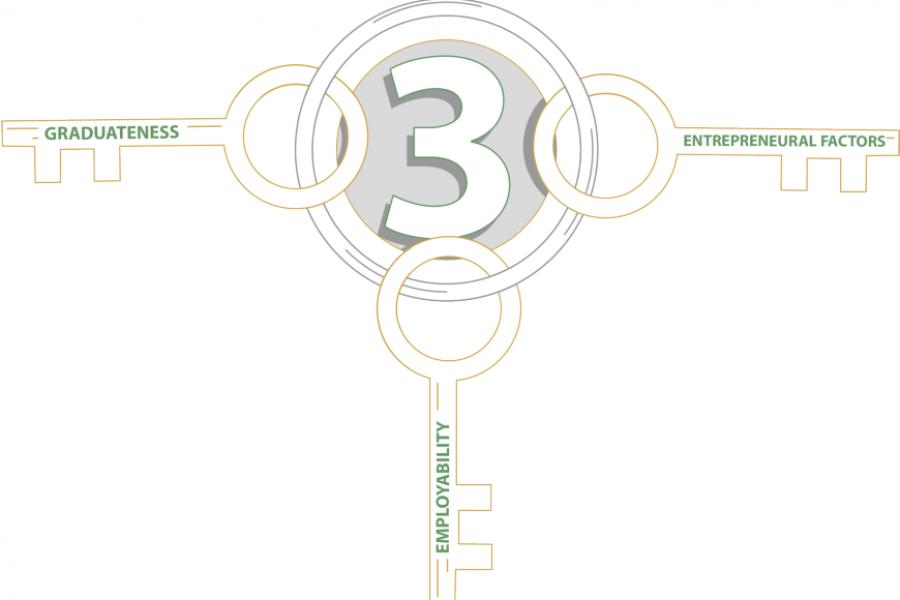 Employer requirements andemployability mindsets
Employer requirements andemployability mindsets
This article explores self-confidence in getting a job, the importance employers attach to the students’ personal growth and intellectual development. It also includes the mindset of students when creating a job.
Employer Requirements and Employability Mindsets
In an article titled, Employer requirements and employability mindsets influencing graduate workers’ self-confidence in gaining employment, authors Coetzee, Ferreira, and Potgieter (2019) explore the relationship between self-confidence in getting a job, the importance employers attach to the students’ personal growth and intellectual development (graduateness) and the students mindset regarding how they market themselves, network themselves and their feelings about creating a job (employability qualities).
The South African labour market, is a difficult place which is uncertain and competitive. This has had a negative effect on the self-confidence levels of graduates. It was shown that people with high self-confidence are able to present themselves well in terms of job searching and remain engaged in their career. Findings show that there is a positive link between how the graduate views the employer, how the employer views the graduate and the graduates self-confidence.
Qualities that employers require within graduates
“Graduateness” relates to employers’ thoughts on the quality of personal growth and intellectual development students acquired through their university or college. Some important qualities include the ability to quickly acquire new knowledge, being educated, trained and capable in the relevant occupational field, having job-specific knowledge and skills, the ability to apply universal, global knowledge, principles, philosophies and paradigms to solve job or work challenges, the ability to communicate in English and the ability to work in teams with people from culturally diverse backgrounds.
Employability qualities in demand
“Employability” qualities relate to ‘soft skills’ which are often in higher demand in the labour market. Employability includes being able to work under pressure, time management, adapting to changing conditions, timeous delivery on targets, updating knowledge and skills, customer service oriented, managing one’s own career development, and engaging in continuous life-long learning activities.
Individuals’ marketability, entrepreneurial orientation and job search orientation
Marketability refers to how the graduate views his/her own qualification (i.e. is their degree good and valued by industry), personal qualities, competencies and work experience. The graduates’ entrepreneurial orientation deals with his/her beliefs about being able to create or gain a job. Graduates must have the mind-set of being actively involved in their own growth and personal development throughout life.
It has been shown that the extremely competitive labour market with economic changes, increased globalisation and challenges associated with a global technology-driven business market has created the demand for more from graduates than just the degree. Employers require that students be able to embrace the qualities of “graduateness”, “employability” and “entrepreneurial orientation” in order to ensure lifelong career success.
Implications of research for Career Development Practitioners
Career development practitioners should create enabling environments for students to explore possibilities for career growth and success not only in their professional capacity but also in their personal capacity. All round learning should encompass all aspects of development and is the responsibility for all tasked with developing a student. In order for this to occur “we” ourselves need to be open to new information and developing our perspectives further because learning is not limited to classrooms or lecture venues.
Implications of the research at a national level
At a national level, there needs to more literature on current and future education and economic aspects that are relevant to our immediate society. This must address the needs of the student and employer. There needs to be planned implemented structures and mechanisms that enhance graduateness and employment based on a common understanding and agreement on what precise “graduate attributes” are required by industry. This must provide a framework and guide measures for effective practises by schools, colleges and universities.
Implications of the research at an institutional level
At an institutional level, development programmes need to be created, implemented and monitored. This requires a high level of commitment from all members involved. Curriculum at tertiary level should include generic attributes required by industry. Learning attributes therefore becomes a shared responsibility between the student and academics.
Implications of the research at a personal level
At a personal level, students need to assume responsibility for developing the personal and professional competencies required by industry. Guidance needs to be provided to students at the national and institutional level so that students are able to understand and respond to the global and local services contexts for professional services. Students need to constantly audit goals and develop realistic expectations about their lives.
Conclusion
This research is meant to create openings for greater understanding into what graduates need in order to gain more self-confidence so that they may present themselves well in terms of job searching, remaining engaged in their career and able to adapt to a changing work. From an employer perspective, these graduates need to work on their ability to quickly acquire new knowledge, be competent in their relevant occupational field and able to solve job or work challenges. Furthermore, these graduates need to ensure they are able to communicate effectively in English and work in teams of people from culturally diverse backgrounds.
Reference:
Coetzee, M., Ferreira, N., & Potgieter, I.L. (2019). Employer requirements and employability mindsets influencing graduate workers’ self-confidence in gaining employment. African Journal of Career Development 1(1), a4.

Latest News
- SACDA News 2023
- SACDA News 2022
- International Think Tank Webinar 2
- International Think Tank Webinar 1
- Bi-Annual South African Congress of Career Practitioners 2021
- Careers in Curriculum
- Growth through Sector Education
- Growth through NanoCPD
- SACDA News 2020
- Quality through Homegrown Interventions
- Access through a Community Approach
- Access through Professional Designation
- Back to Basics
- Professional Boundaries in Career Services
- Employer requirements and employability mindsets
- Farewell Thandeka Langa
- Inaugural Congress for Career Development Practitioners
- SACDA Privacy Policy
- SACDA News 2018
- Code of Ethics